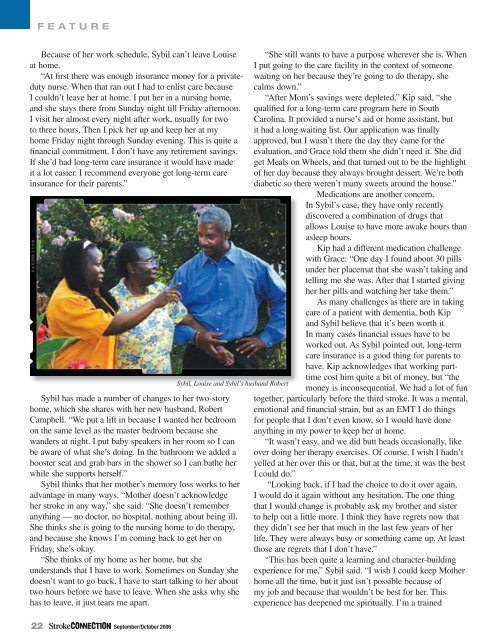Survivor Louise Ingram - American Stroke Association
Survivor Louise Ingram - American Stroke Association
Survivor Louise Ingram - American Stroke Association
Create successful ePaper yourself
Turn your PDF publications into a flip-book with our unique Google optimized e-Paper software.
Because of her work schedule, Sybil can’t leave <strong>Louise</strong><br />
at home.<br />
“At first there was enough insurance money for a privateduty<br />
nurse. When that ran out I had to enlist care because<br />
I couldn’t leave her at home. I put her in a nursing home,<br />
and she stays there from Sunday night till Friday afternoon.<br />
I visit her almost every night after work, usually for two<br />
to three hours. Then I pick her up and keep her at my<br />
home Friday night through Sunday evening. This is quite a<br />
financial commitment. I don’t have any retirement savings.<br />
If she’d had long-term care insurance it would have made<br />
it a lot easier. I recommend everyone get long-term care<br />
insurance for their parents.”<br />
Sybil has made a number of changes to her two-story<br />
home, which she shares with her new husband, Robert<br />
Campbell. “We put a lift in because I wanted her bedroom<br />
on the same level as the master bedroom because she<br />
wanders at night. I put baby speakers in her room so I can<br />
be aware of what she’s doing. In the bathroom we added a<br />
booster seat and grab bars in the shower so I can bathe her<br />
while she supports herself.”<br />
Sybil thinks that her mother’s memory loss works to her<br />
advantage in many ways. “Mother doesn’t acknowledge<br />
her stroke in any way,” she said. “She doesn’t remember<br />
anything — no doctor, no hospital, nothing about being ill.<br />
She thinks she is going to the nursing home to do therapy,<br />
and because she knows I’m coming back to get her on<br />
Friday, she’s okay.<br />
“She thinks of my home as her home, but she<br />
understands that I have to work. Sometimes on Sunday she<br />
doesn’t want to go back. I have to start talking to her about<br />
two hours before we have to leave. When she asks why she<br />
has to leave, it just tears me apart.<br />
22<br />
F E A T U R E<br />
September/October 2006<br />
Sybil, <strong>Louise</strong> and Sybil’s husband Robert<br />
“She still wants to have a purpose wherever she is. When<br />
I put going to the care facility in the context of someone<br />
waiting on her because they’re going to do therapy, she<br />
calms down.”<br />
“After Mom’s savings were depleted,” Kip said, “she<br />
qualified for a long-term care program here in South<br />
Carolina. It provided a nurse’s aid or home assistant, but<br />
it had a long waiting list. Our application was finally<br />
approved, but I wasn’t there the day they came for the<br />
evaluation, and Grace told them she didn’t need it. She did<br />
get Meals on Wheels, and that turned out to be the highlight<br />
of her day because they always brought dessert. We’re both<br />
diabetic so there weren’t many sweets around the house.”<br />
Medications are another concern.<br />
In Sybil’s case, they have only recently<br />
discovered a combination of drugs that<br />
allows <strong>Louise</strong> to have more awake hours than<br />
asleep hours.<br />
Kip had a different medication challenge<br />
with Grace: “One day I found about 30 pills<br />
under her placemat that she wasn’t taking and<br />
telling me she was. After that I started giving<br />
her her pills and watching her take them.”<br />
As many challenges as there are in taking<br />
care of a patient with dementia, both Kip<br />
and Sybil believe that it’s been worth it.<br />
In many cases financial issues have to be<br />
worked out. As Sybil pointed out, long-term<br />
care insurance is a good thing for parents to<br />
have. Kip acknowledges that working parttime<br />
cost him quite a bit of money, but “the<br />
money is inconsequential. We had a lot of fun<br />
together, particularly before the third stroke. It was a mental,<br />
emotional and financial strain, but as an EMT I do things<br />
for people that I don’t even know, so I would have done<br />
anything in my power to keep her at home.<br />
“It wasn’t easy, and we did butt heads occasionally, like<br />
over doing her therapy exercises. Of course, I wish I hadn’t<br />
yelled at her over this or that, but at the time, it was the best<br />
I could do.”<br />
“Looking back, if I had the choice to do it over again,<br />
I would do it again without any hesitation. The one thing<br />
that I would change is probably ask my brother and sister<br />
to help out a little more. I think they have regrets now that<br />
they didn’t see her that much in the last few years of her<br />
life. They were always busy or something came up. At least<br />
those are regrets that I don’t have.”<br />
“This has been quite a learning and character-building<br />
experience for me,” Sybil said. “I wish I could keep Mother<br />
home all the time, but it just isn’t possible because of<br />
my job and because that wouldn’t be best for her. This<br />
experience has deepened me spiritually. I’m a trained







